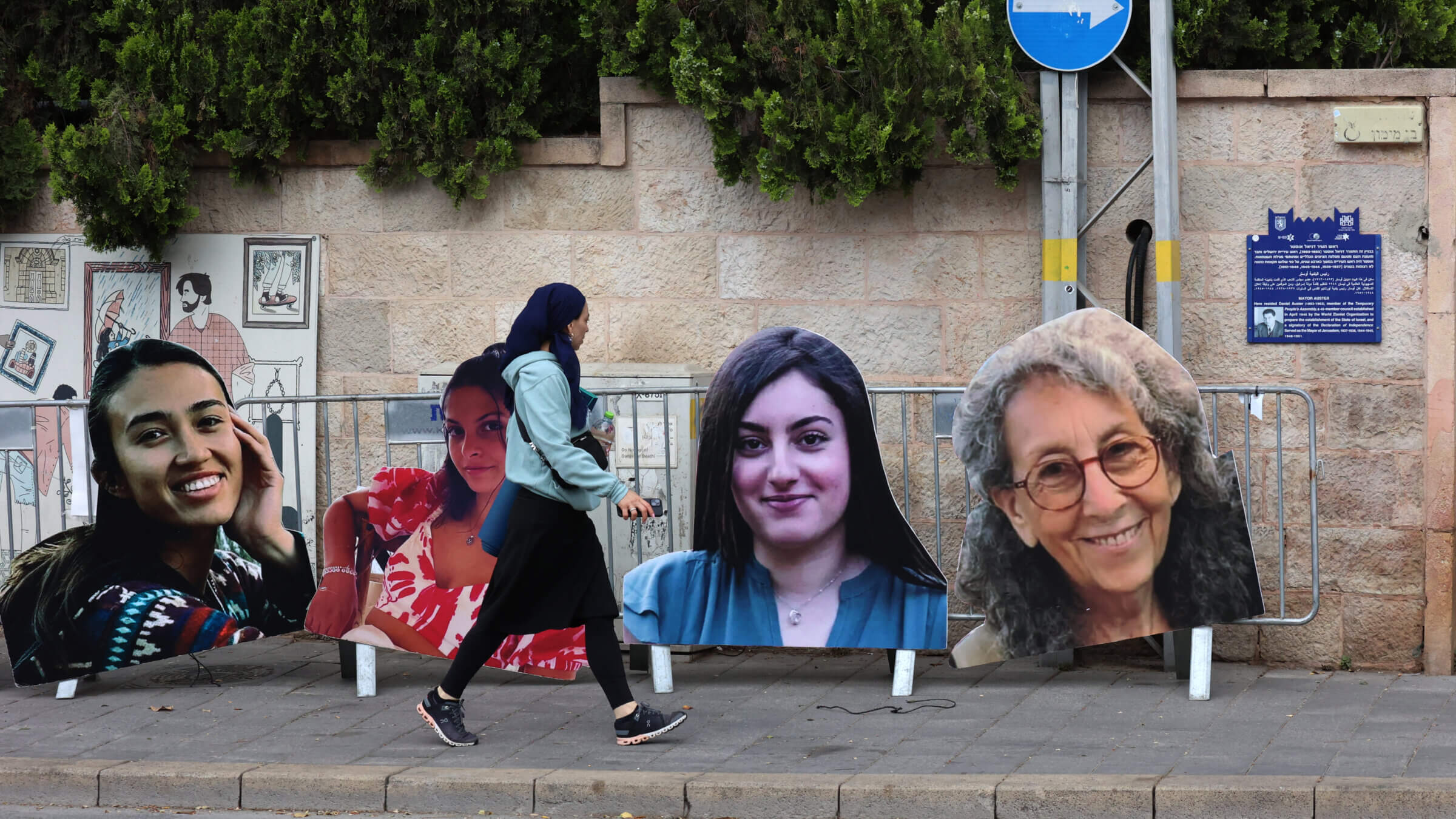Shirel Golan survived the Nova massacre but died by suicide. Online denial may be to blame
One year after Oct. 7, young women who survived face campaigns that deny sexual violence

A woman walks past large cardboard cutout portraits of Israeli women held hostage in Gaza since the October 7 attacks, set up by relatives and supporters during a protest calling for their release in front of the Prime Minister’s residence in Jerusalem. Photo by Gil Cohen-Magen/AFP via Getty Images
Many survivors of Oct. 7 have spent the past year testifying about what happened to them. They find meaning in speaking for those who no longer can — those who were murdered or abducted, as well as those who were silenced by their trauma.
But many of these survivors, especially young women who witnessed or experienced sexual violence at the Nova music festival, have told me over the past year that they feel like they are screaming into the void as they try to counter anti-Israel propaganda and misinformation online.
This weekend, we witnessed the tragic toll that can result from these survivors having to relive the most horrible day of their lives over and over again, from them being stuck in an endless loop of trauma. Shirel Golan, who was rescued by a police car as she fled the Nova site, died by suicide on her 22nd birthday, after twice being hospitalized with acute symptoms of post-traumatic stress disorder including disassociation and withdrawal.
The brutal atrocities committed on Oct. 7, especially against the thousands of young people attending the Nova festival, were beyond imagination. I do not know how anyone experiences these horrors and moves on. Adding to the trauma of witnessing their friends hunted down, tortured, raped and murdered by terrorists, these survivors are also facing a world that refuses to believe their accounts.
Online, female hostages who have shared how they were sexually assaulted when in Hamas captivity have faced denial and mockery. “She is lying through her teeth and reading through a script,” read one of the more charitable replies to Amit Soussana’s testimony of being groped and forced to perform a sexual act on her captor.
Other survivors like Golan see this. It makes healing — let alone sharing what happened — feel impossible. In her December 2023 report on the situation in Israel, United Nations Special Representative Pramila Patten noted that “the national and international media scrutiny of those who made their accounts public hindered access to survivors of the attacks, including potential survivors/victims of sexual violence.”
Campaigns to deny systematic, conflict-related sexual violence are as old as the use of rape as a weapon of war. But social media’s ability, today, to spread these messages of denial to millions compounds the spread of terror and trauma. Even more insidious is the use of campaigns to reshape the narrative; to justify “rape as resistance,” claiming it was therefore deserved, to blame the survivor for what happened to her.
Is this denial why Golan died by suicide? Was it the agony of knowing that 11 people she’d left the festival in a car with were murdered? A lack of adequate mental health support? We will never know for sure.
My Israeli peers who work to support sexual violence survivors have told me that the lack of adequate resources for survivors, in light of the overwhelming number of victims, is a serious problem. The events of Oct. 7 have likewise been retraumatizing for survivors they serve, leading to a deluge of demand for care and institutional support. “The state killed Shirel,” her brother, Eyal, told The Jerusalem Post. “If the state doesn’t wake up, there will be more cases like this.”
The strategic campaign that effectively turned the world against the victims and survivors has made recovery all the more lonely and dark.
There is a reason those of us who work to end gender-based violence know that we must believe survivors, never blame the victim, and understand that rape is never justified. Not doing so inflicts further harm. When I was in Israel in May, the survivors and those working to support them told me again and again that the most important way to help was to share their stories.
Working together over the past year, I’ve gotten to know the leaders of Israeli women’s organizations on a much deeper level. But I’ll never forget what Miriam Schler, executive director of the Tel Aviv Rape Crisis Center, told me soon after Oct. 7: “What’s worse is that the world does not believe us.”
The Hamas terror attack on Israel that day was one of the most documented atrocities in history, thanks in part to the footage taken by the terrorists themselves, as well as video from security cameras and survivors’ and victims’ cell phones. There are hundreds of thousands of pieces of video and photographic evidence, as well as survivor, eyewitness, and first responder testimony.
It is easy to dismiss evidence that does not conform with one’s narrative as fake news. But one does not need to care about or even support Israel to care that women who were raped are being silenced and humiliated.
International bodies tasked with bringing perpetrators of conflict-related sexual violence to justice must include what happens online in their investigations. Spreading terror and trauma through online campaigns, if unchecked, becomes a deadly weapon.
Survivor’s guilt is real. And it is compounded when Israelis see accounts online every day vilifying their very existence and denying or even celebrating the atrocities they have endured.
The evidence should speak for itself. But without addressing the toxic and deadly online rhetoric, survivors everywhere will continue to suffer. I believe Israeli women. And it is because of this belief, and our commitment to all survivors of sexual violence, that we must never let what happened to them be denied or erased.





















